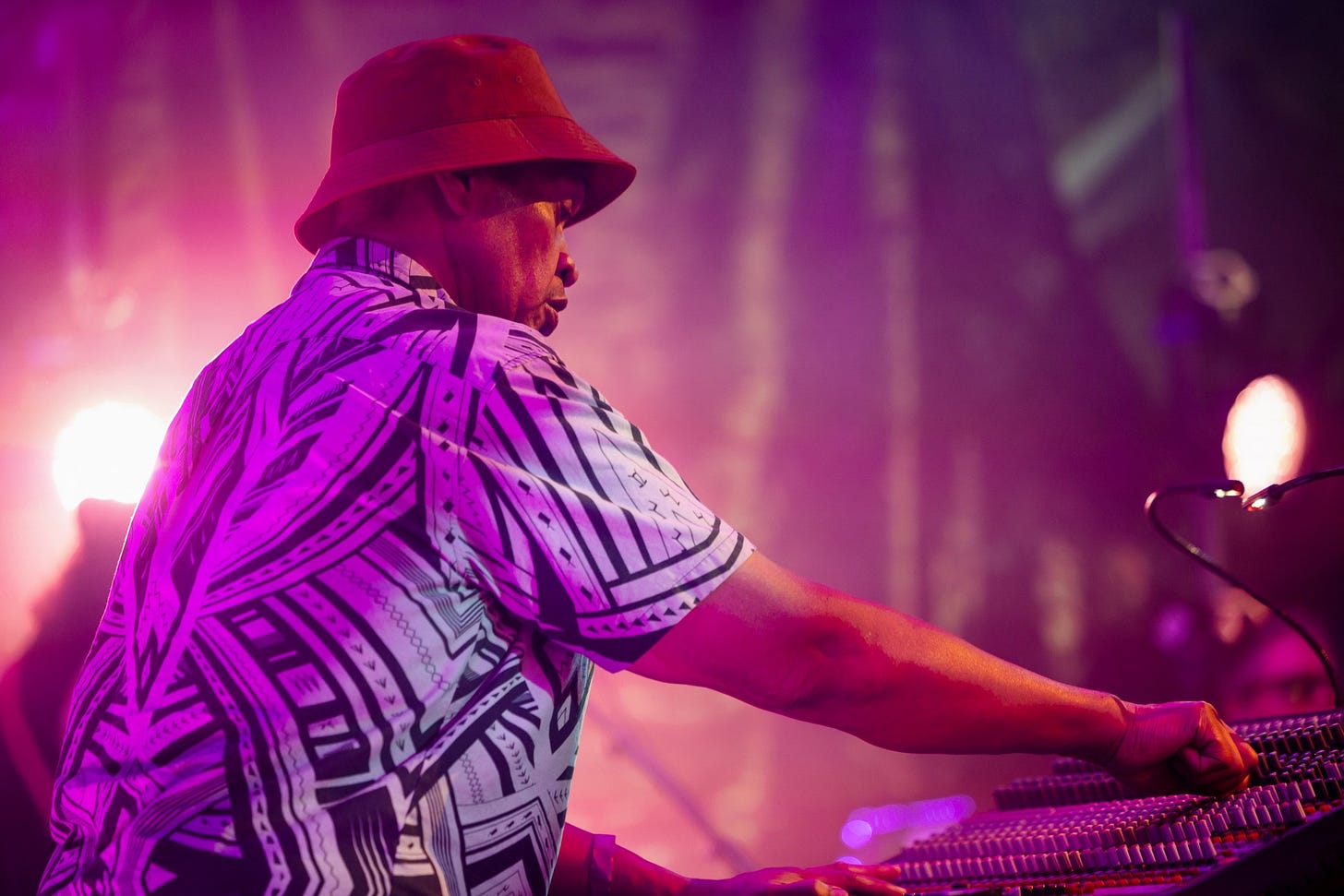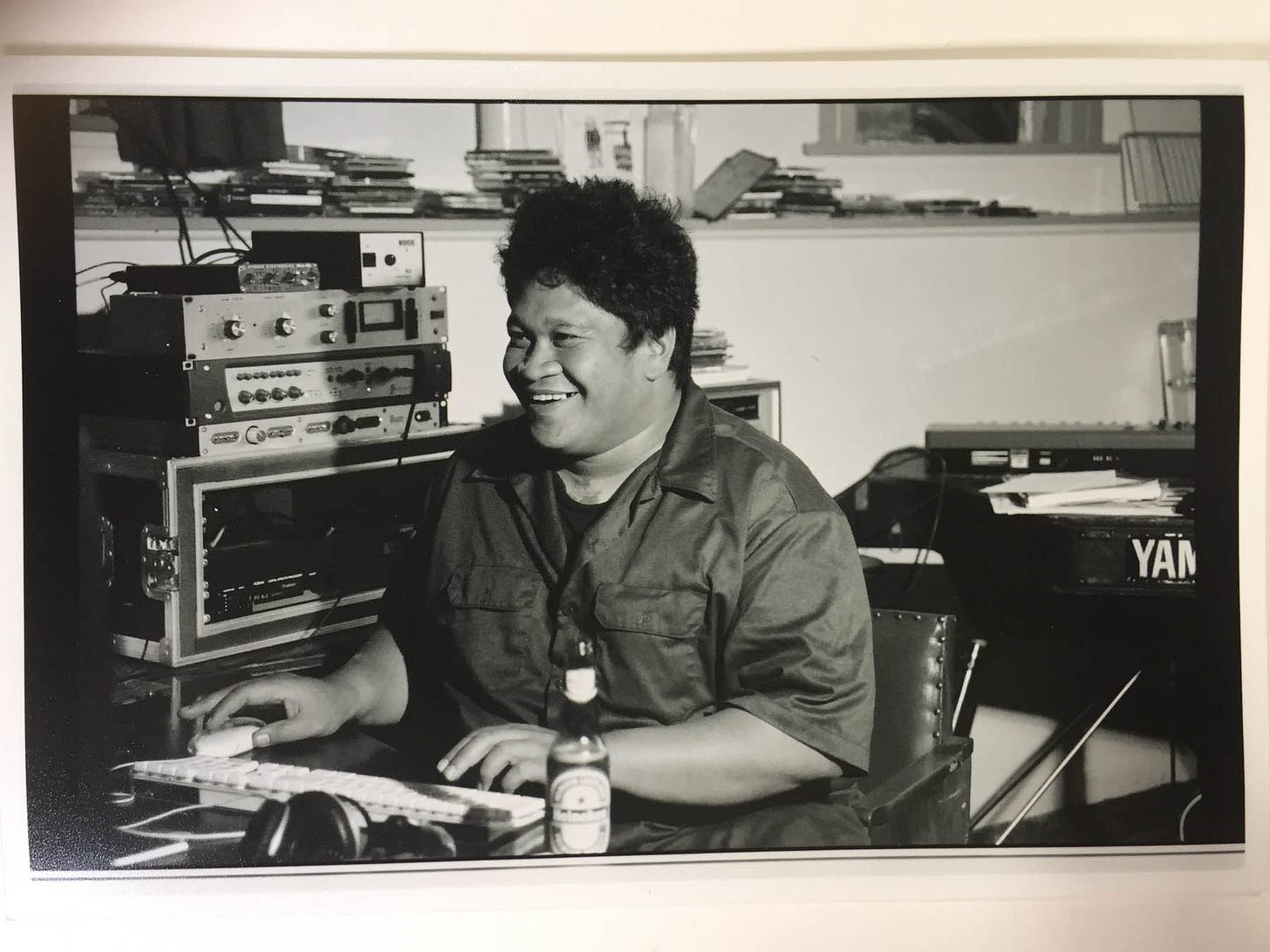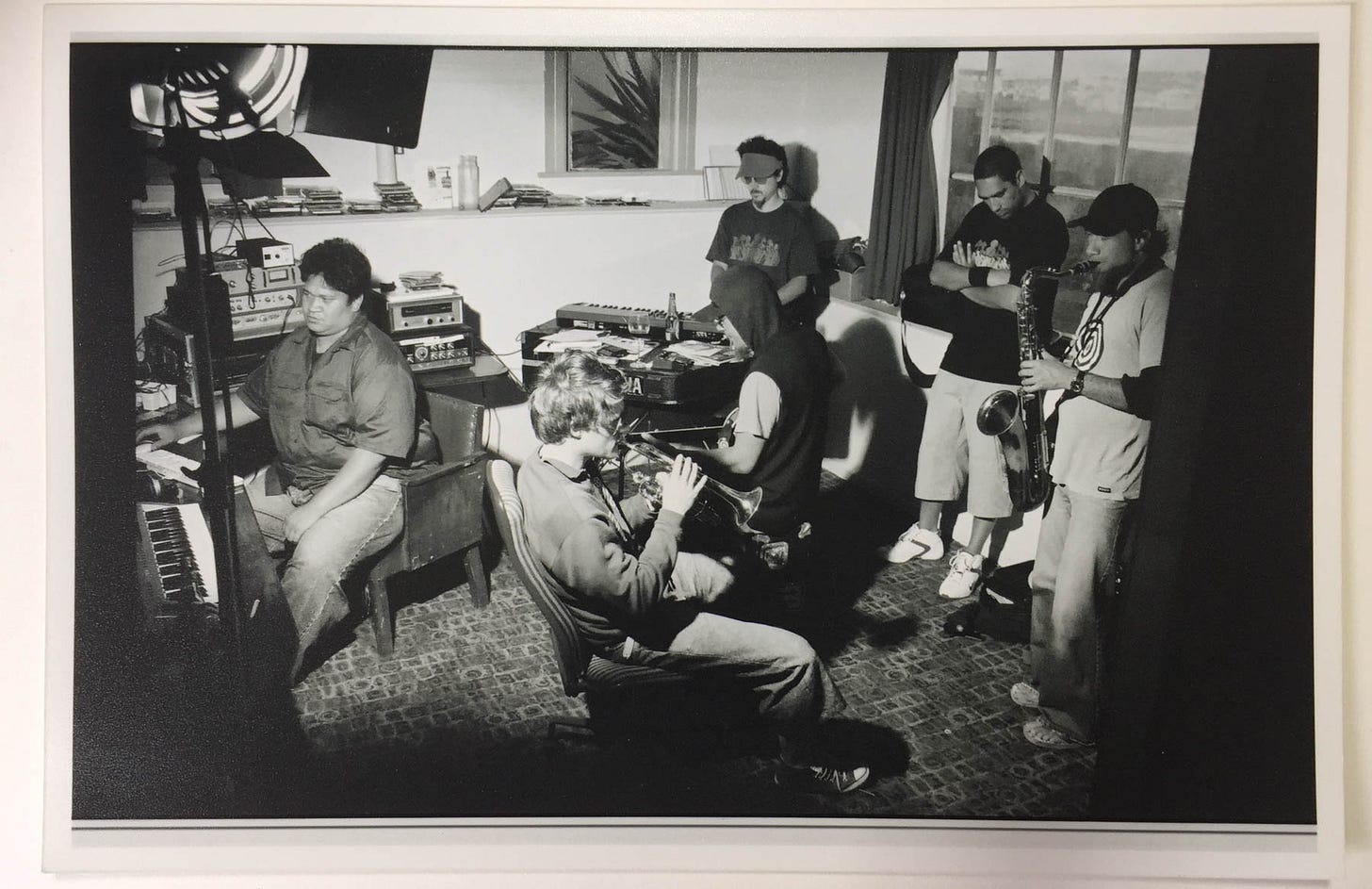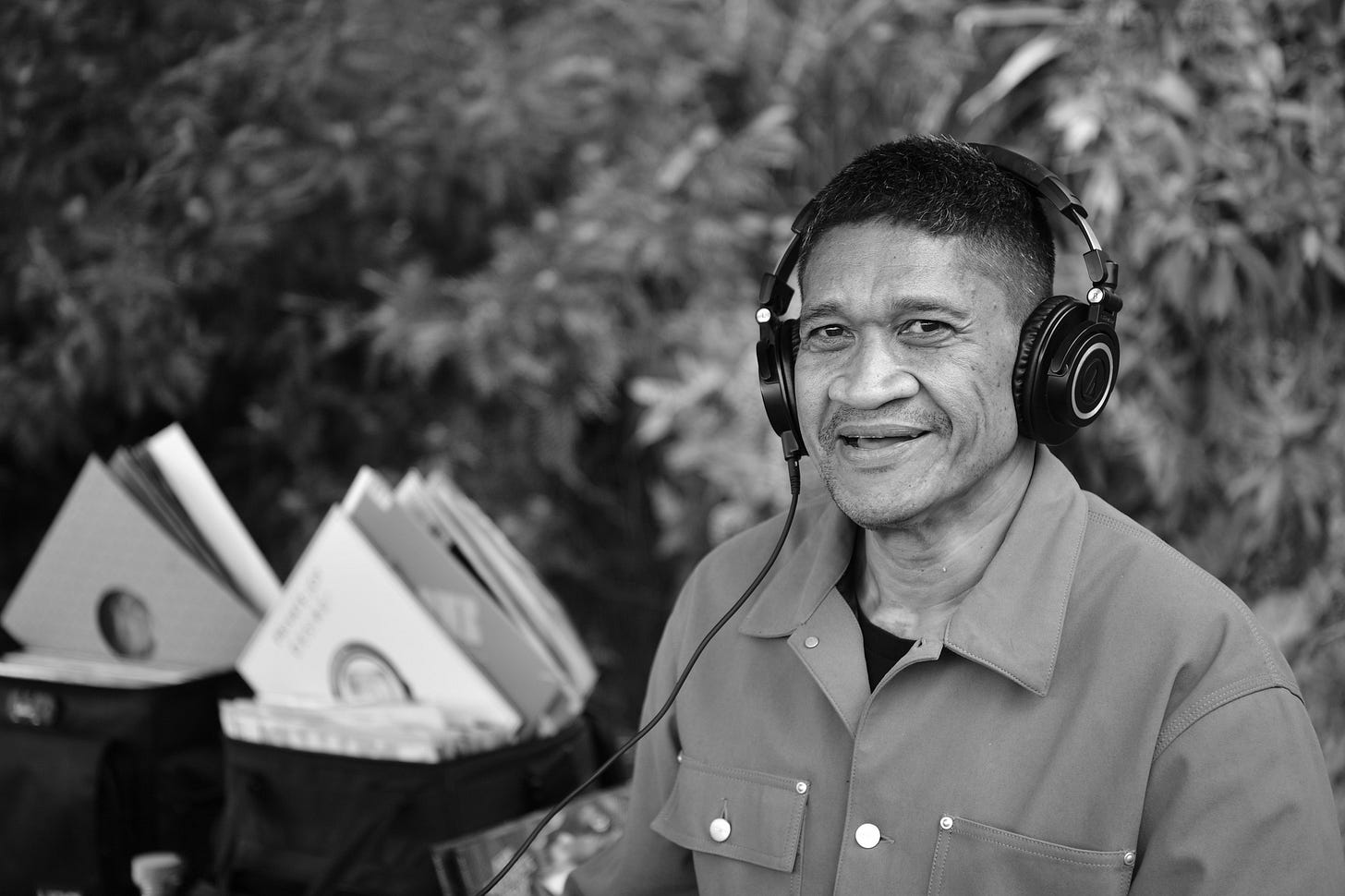Remembering Mu
A tribute to the late great Chris Faiumu of Fat Freddy's Drop
Selected Works is a weekly (usually) newsletter by the Te Whanganui-a-Tara, Aotearoa (Wellington, New Zealand) based freelance music journalist, broadcaster, copywriter and sometimes DJ Martyn Pepperell, aka Yours Truly. Most weeks, Selected Works consists of a recap of what I’ve been doing lately and some of what I’ve been listening to and reading, paired with film photographs I’ve taken + some bonuses. All of that said, sometimes, it takes completely different forms.
Last night, news broke about the death of the DJ, audio engineer and producer Chris Faiumu of Fat Freddy’s Drop, better known as Mu or DJ Fitchie. Here’s my tribute to the great man.
Mu was a beacon. He was like a lighthouse, and his legacy always will be. For a long time, he was Wellington’s lighthouse, shining his light on good tunes, good laughs, and good times. People knew him from record stores, bars, gigs, studio sessions, Radio Active, social sports games, or even just a wave and a nod on Cuba Street or out Lyall Bay way.
The Fonky Monks, Roots Foundation, Crackhead Experience, Bongmaster, Fat Freddy’s Drop, Joe Dukie and DJ Fitchie, Friday nights at The Matterhorn with Mu and Vee, the list goes on. Collaborator to many, remixer to Trinity Roots, Ebb, Che Fu, Salmonella Dub. Again, the list goes on.
As I said, for a long time, Mu was like a lighthouse in Wellington. Then he became a lighthouse around New Zealand and further afield across Australia and Europe. I like to imagine they erect a statue of him in Berlin or Barcelona. We should get onto doing that here first.
I’m younger than the Freddy’s guys, so I didn’t really become cognizant of Mu’s existence until my final two years of high school. Then, all of a sudden, there he was, looming large over music in Wellington. By that point, he’d been there for a while; I just hadn’t known how to look.
Reflecting on the late 1990s and early 2000s, there are a few memories of Mu that are etched into my brain with laser-like clarity. The first time I saw him DJ was at the Whairepo Lagoon Whopper Chopper, or maybe a Roots Foundation gig. A big man with a big afro, playing bigger beats. He didn’t always give the audience what they wanted. He gave them what they needed—Reggae, dub, hip-hop, funk, jungle, 2-step/garage, techno, neo soul. Mu was diverse, but the diversity always made sense.
When Trinity Roots released their first EP, I was blown away by his remix of ‘Little Things’. It was soulful, junglistic, futuristic and ancient all at the same time. It felt connected. I got a copy of the DJ Fitchie & Joe Dukie 12” early as well. Ostensibly, ‘Midnight Marauders’ was the big tune, but I loved the boombap soul sensibilities of ‘Seconds’. It’s a perfect tune. I wish he’d made more like it, but Mu was like the weather. He changed when he wanted to.
Part of what made his music production really click for me was seeing him up close at one of the first Wellington MPC battles in the old Matterhorn courtyard. Don’t get me wrong, there were a few guns in the house who knew their way around the pads on the Akai MIDI Production Center, but Mu’s touch was different. He was one of one. Over the following years, he inspired a whole generation to study the blade.
That night, Mu performed a slow-building song with a vocal from an unnamed soul singer. I still remember the hook. “From blackest black to blackest night / From deepest dark to deepest sound / From blackest black to blackest night / The night that shows you no respite”
I’d love to hear it one more time.
It’s hard to place the first time I saw Fat Freddy’s Drop perform live. I think it was the Days Bay Whopper Chopper. That was a roadblock of an event. Traffic jams for hours afterwards. The time they played an afternoon set on the final day of the South Island festival, Alpine Unity looms large as well. They had Ladi6 on stage with them that time. I also have memories of a late-night gig at Studio9, Waitangi Day at the Velodrome, and possibly the Cuba Street Carnival.
Like many Wellingtonians, I discovered the band through their Live At The Matterhorn CD. I used to thrash that one. Apparently, only twenty or thirty people were at that show, but you’d never know it. At their best in those early years, Freddy’s channelled a South Pacific fusion of dub, techno and soul. Sometimes we called it hi-tek soul. It was in tradition, but it was headed somewhere. A big part of that was the drive of Mu’s beats and basslines.
I was overseas when Fat Freddy’s Drop really took off, and I was busy having my own adventures in Montreal and New York. Even from a distance, the rise was glorious, unprecedented and ultimately record-breaking. I’ll always cherish the years when it felt like Freddy’s, Trinity Roots and Ebb belonged to Wellington, but I’m glad they got to take it all the way to the stadiums, arenas and summer festivals of Europe. At this point, they’re a cult fixture on the circuit with an intergenerational audience. They did it all independently as well, on their own terms. It’s very south coast.
During conversations over the years, I pieced together an outline of the man’s life before he found his place behind the MPC. Growing up in a sports-loving Samoan family in suburban Wainouimata, he was an outlier, drawn to music, particularly the sounds of 1970s and 1980s Black America. He got into some of this when he recorded a mixtape for Radio New Zealand in 2016.
After spending his high school years at Scott’s College, he spent a brief stint in the military. The man used to abseil out of helicopters. Allegedly, he even got to blow up a tank. That said, Mu and the service weren’t meant to be. Next, he attended Victoria University, where studying took a backseat to basketball games and DJing on the local student radio station, Radio Active. His passion for sound locked in, Mu studied audio engineering at Tai Poutini Polytech in Greymouth, before taking on an audio engineering job back in Wellington at Active. Once the DJing took off, he could afford to add a vocalist and horns to his sets. In incremental steps, Fat Freddy’s Drop was born.
At present, there’s not a lot of information about him online. There are a lot of threads that need to be pulled here. He didn’t reveal much in interviews either. Mu was a lighthouse, but he could also be very opaque. And there was always more work ahead.
In the late 2000s, my friends brought the UK dubstep pioneer Mala from Digital Mystikz to Wellington to DJ. Since Mala created a mercurial remix of ‘Cay’s Cray’s’ for Freddy’s and opened for them in South London, they booked Mu to open for him down here. On the night, the respect felt mutual. As Mala told me at the time, “Freddy’s are the shit man, to play just before them and seeing them live in South London playing to five thousand people was inspirational, they were so tight and it was different to see a band with no live drummer! Mu’s beats are tight. As I said, I love Fat Freddy’s Drop.”
Seven years later, I was in the audience when Fat Freddy’s Drop performed in Tokyo for the first time. On the night, I was reminded that as much as New Zealand associated them with reggae, dub and soul, funk and techno remained a huge part of their musical backbone. A big part of that was driven by Mu’s clarity of vision and technical prowess. On stage and off, he projected a calming energy, underscored by the confidence from his belief in his art. Mu made you believe that if you stayed the course and weathered the storms, you would reach your destination.
Spinning 7” reggae singles always appeared to be one of Mu’s happy places. In recent years, he reappeared on the roster of Radio Active’s Sunday Roots & Culture show. There was a full circle of poetry to it all—a beauty in seeing the prodigal son return to where it all started. The times had changed, and the station had moved spaces three times, but a vibe still hung in the air.
Today, tomorrow, and all the hard and beautiful days ahead of us, I’ll be thinking of Mu’s family, friends and fans. In the scheme of things, I’m just a fan, but like Ladi6, I know Time is Not Much. Like Dallas sang in that courtyard all those years ago, “Run to the place you know is home.” Mu earned his rest. It’s up to the rest of us to take it from here.
FIN.






Man well said, this hits deep without personally knowing him but because the music hits deep real deep….
Thanks Martyn for the history, insights, love and stories. I remember him playing at the Matterhorn. We use to spark up out the back, move the tables and chairs make the dance floor just a wee bit bigger.
Mumu aka Wills